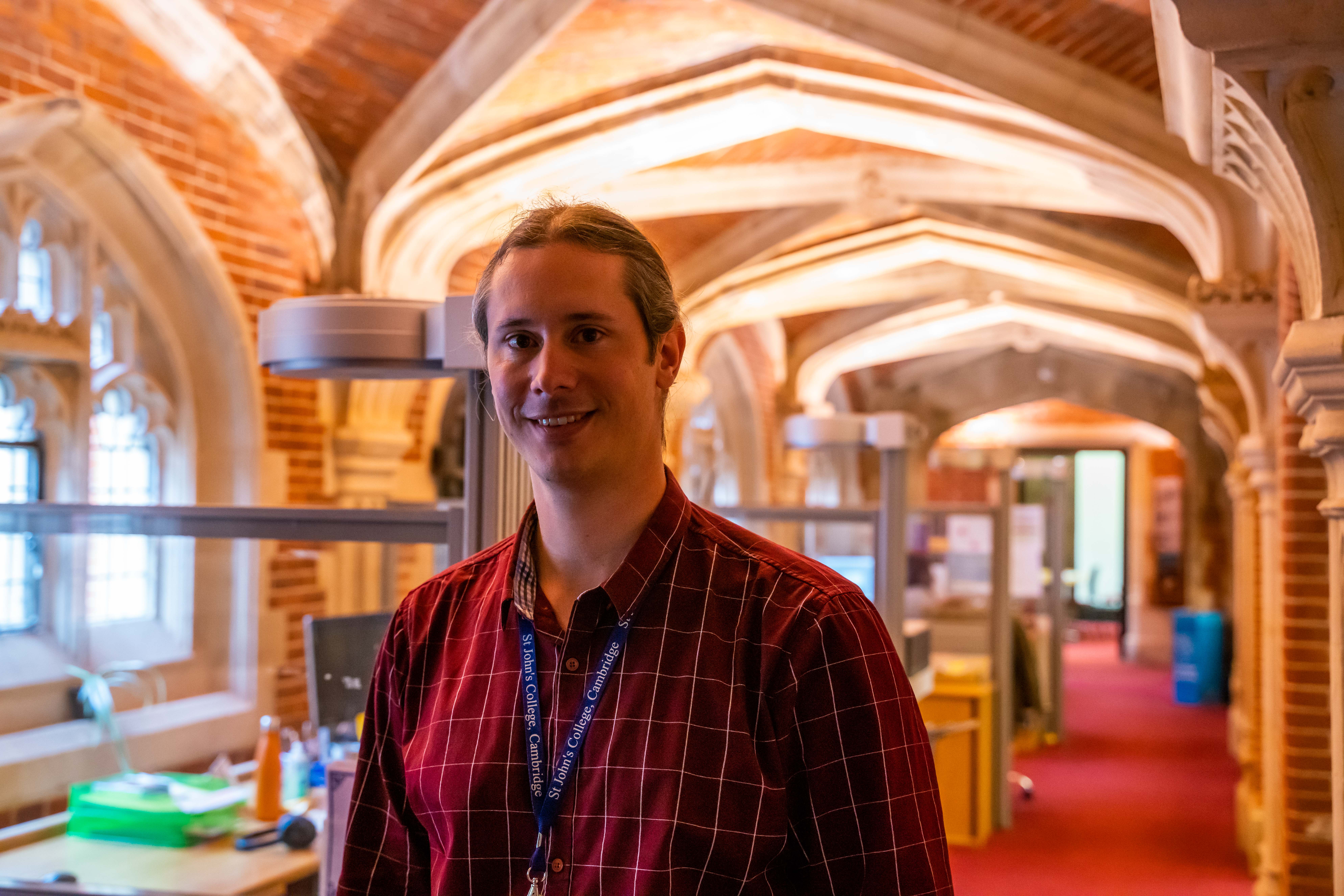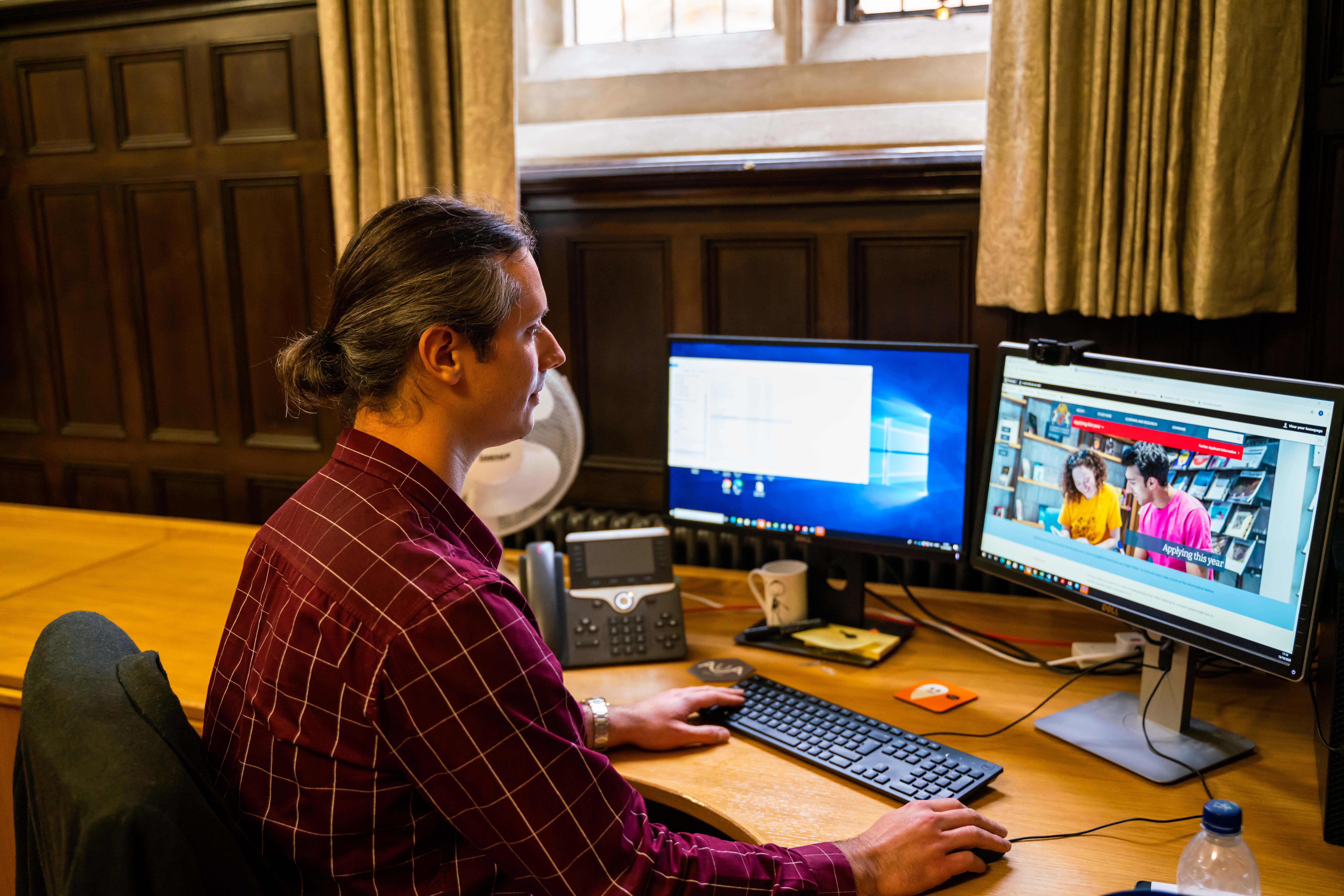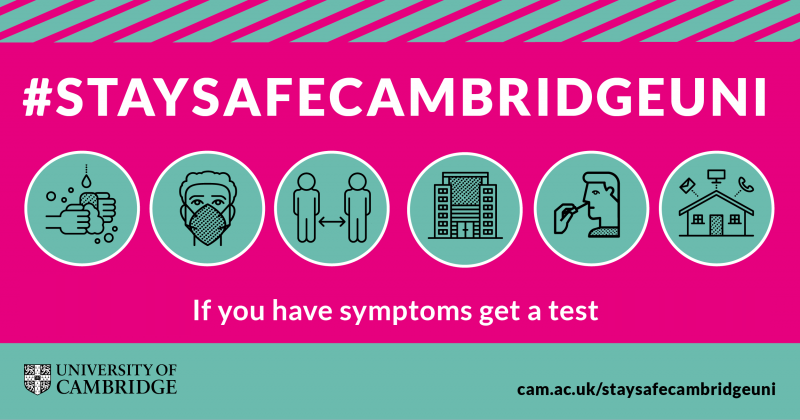Dining room to Old Divinity School
"When students turn up to start their courses, there is a sense of completion and fulfilment, because that's the real aim of the whole admissions process"
In the second article in our series of pandemic stories from St John’s, Ross Agnew, Undergraduate Admissions Administrator, talks about starting a new job during lockdown, navigating the A-Level results crisis, and the unexpected silver linings for Cambridge Admissions.
April was a strange time to begin a new job. I had just done my final weeks in the Cambridge Admissions Office, where I was Deputy Head of Undergraduate Admissions. I was introduced to key colleagues remotely and everyone was really friendly. I was working from the dining room table, and my wife Eliza was sitting exams for her optometry degree. We have two small children, six and three, so we were also juggling home schooling and childcare. We’ve all seen clips on the news where correspondents had children pop up in the background and that was me! Everyone's been very accepting that people's home situations aren't always ideal.
Taking everything online has actually been a positive experience. Doing things virtually means we can reach a wider audience, particularly underrepresented groups of students or schools, so there are some silver linings. Everyone in the team was eager to return to our office in the Old Divinity School and we’re all now back working in a socially distanced way and it is going really well, although we can’t have in-person visitors yet.

Even in the period before Covid came along, it was a time of change for Admissions. We are actively seeking innovative ways of looking at access and participation targets and how to meet them – there is always more work we could do to show Cambridge is for every outstanding candidate, no matter their background. The pandemic just sped everything up.
The A-Levels crisis in August was very difficult. The Cambridge Admissions Office's quick analysis of the initial results had shown that there were groups that had been disadvantaged by the way the grades had been calculated by the algorithm, and we were working hard behind the scenes to address it as best we could. We welcomed the government’s decision to allow Centre-Assessed Grades by teachers to stand as it was the only way to make the situation fair on those most disproportionately affected. We have taken a record number of new undergraduate students this academic year – 191 compared to our usual 170-175. A lot of planning has gone into how to physically accommodate the extra students safely. It is our most diverse intake ever so there are a lot of positives that we are taking out of what seemed to be a chaotic national mess.
You can easily lose your head when the goalposts are changing daily, and there's a lot of work to be done in a very short space of time. I think we kept cool in the eye of the storm. We have even made arrangements for people who didn't meet the grades, and who have the opportunity of taking their exams in the autumn, to come in 2021 if they meet the conditions of their original offer. We came up with a result that pleased all parties involved, given the circumstances. That’s no mean feat.
All our interviews for our 2021 entry will take place remotely for the first time this year. We're going to survey all the applicants and ask them about the Covid disruption they've experienced, which is going to be important when we're assessing applications. And we are going to ask them about the access to technology, such as whether they have a smartphone, or a tablet or a laptop, what sorts of software they're familiar with using, because we want to level the playing field.
We're investing in tablets to provide to applicants who don’t have access to technology to use for the interviews. As well as being more accessible to disadvantaged students, there are environmental benefits this year. In the past, people had to travel to Cambridge from all over the world which is not very green. So another Covid silver lining is that we have a chance to trial large-scale remote interviewing, technology and process. If all goes well, we'll feel more confident about using this in the future.

Our applications will be completely electronic for the first time, there will be no hard copies at all - previously Colleges had thousands of physical files to review. I’m genuinely very excited about how much easier this will make the admissions processes. Last year, we had about 1,200 applications and we interviewed around 900 people. The remote interviews will be quite challenging but we have already started planning for them with the academic administrators and our student ambassadors.
I was drawn to College Admissions because you develop a relationship with applicants and get to know their stories. When students turn up to start their courses, there is a sense of completion and fulfilment, because that's the real aim of the whole admissions process. Witnessing their successful academic careers in the College will be very rewarding. Some students were initially anxious about this academic year, but they were very keen to come and get on with their courses despite the disruption.
I’m still blown away by the disparity between the beauty around me at College and my dining room at home! It is even nicer with the students here now because, at the end of the day, that's what it's all about.
First in this series: Above and beyond
Published: 16/10/2020
